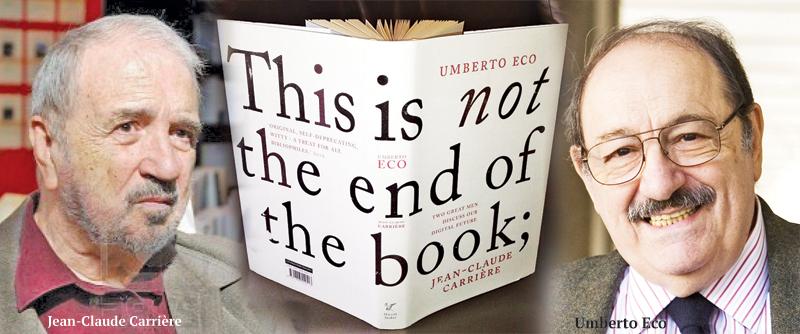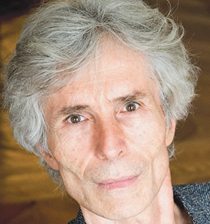
This is Not the End of the Book, is not a sentence or a phrase in a paragraph, but the title of a very special book on the future of the book or the hardcopy book in all digitalised or the Internet world. It is in fact a single conversation between two European intellectuals, Jean-Claude Carrière and Umberto Eco, and it was curated by Jean-Philippe de Tonnac, a writer and editor. This thought-provoking conversation discusses everything from how to define the first book to what is happening to knowledge now that infinite amounts of information are available at the click of a mouse.
Though the resource persons of the book are intellectuals, they have separate identities. For instance, Jean-Claude Carrière is mainly a playwright and screenwriter, who once collaborated with Michael Haneke on his award-winning film The White Ribbon, and Umberto Eco is a novelist as well as a critic other than a philosopher. His first novel, The Name of the Rose, a major international bestseller, has also been translated into Sinhala as Rosa Male Nama which won the state literary prize for the best translation.
The first chapter of the book, titled The book will never die, starts with the following conversation:
Four phenomena
Jean-Claude Carrière: “ At the World Economic Forum in Davos in 2008, one of the speakers was a futurologist who argued that four phenomena would drastically change humanity over the next fifteen years. The first was oil at 500 dollars a barrel. The second was that water, like oil, would become a commercial product, and be traded on the Stock Market. The third was the inevitability of Africa becoming an economic power – certainly something we would all like to see”.
 Jean-Philippe deTonnac
|
"The fourth phenomenon, according to this professional prophet, was the disappearance of the book.
"The question is whether the permanent eclipse of the book – Should it in fact take place – would have the same consequences for humanity as the predicted shortage of water, or affordable oil."
Umberto Eco: “Will the book disappear as a result of the Internet? I wrote about this at the time –by which I mean at a time when the question seemed topical. Now, when I'm asked for my opinion, I simply repeat myself, rewriting the same text….
"There is actually very little to say on the subject. The Internet has returned us to the alphabet. If we thought we had become a purely visual civilisation, the computer returns us to Gutenberg's galaxy; from now on, everyone has to read. In order to read, you need a medium. This medium cannot simply be a computer screen. Spend two hours reading a novel on your computer and your eyes turn into tennis balls. At home, I use a pair of Polaroid glasses to protect my eyes from the ill effects of unbroken onscreen reading. And in any case, the computer depends on electricity and cannot be read in a bath, or even lying on your side in bed.
"One or two things will happen: either the book will continue to be the medium for reading, or its replacement will resemble what the book has always been, even before the invention of the printing press. Alterations to the book–as–object have modified neither its function nor its grammar for more than 500 years. The book is like the spoon, scissors, the hammer, the wheel. Once invented, it cannot be improved. You cannot make a spoon that is better than spoon." (Pages 3–4–5)
Fascinating insights
The two intellectuals give the reading public fascinating insights into the book. There, Jean-Claude Carrièresays, "In the religions of the Book, the book has served not only as a container or receptacle but also as a 'wide–angle lens' from which to view everything and tell everything, and perhaps decide it as well. It has been the point of arrival and of departure – giving us our image of the world, and of the end of the world too." (Page 112)
He also points out, "A work of art isn't created a masterpiece, it becomes one. It's important to add that great books have a reciprocal effect on each other through their readers. We can of course explain the great influence that Cervantes had on Kafka. But we can also, as Gerald Genette has conclusively shown, say that Kafka has had an influence on Cervantes. If I read Kafka before reading Cervantes, then through me and without my knowing it, Kafka will impact on my reading of Quixote. Just as our journey through life, our personal experiences, the time in which we live, the knowledge we imbibe, everything, even our domestic problems and our children's misfortunes, all of it has an impact on our reading of old books." (Page 159)
In this way the book is full of new insights into the book, literature and readership so that it could be an academic as well as light reading text. In fact, itshows us how to present a scholarly subject in a simple way. Following is yet another insight by Umberto Eco into the reading:
"... I have to admit that I only read War and Peace when I was forty. But I knew the basics before then. You've mentioned the Mahabharata – I've never read that, despite owning three editions in three different languages. Who's read The Thousand and One Nights from beginning to end? Who has actually read the Kama Sutra? And yet everyone talks about it, and some practice it too. So, we can see that the world is full of books that we haven't read, but that we know pretty well.….
Several responses
There are several ways of responding to the person who comes to your house, notices your impressive library and can only think to say, 'Have you read them all?'….
"Personally, I've two replies. The first: 'No. These are just the books I'm planning to read next week. The ones I've already read are at the university.' The second: 'I haven't read any of these books. Why would I keep them, otherwise?' There are of course more contentious responses, if you're willing to further antagonise and even anger your guest. The truth is that we all own dozens, or hundreds, or even thousands (in the case of an extensive library) of books that we haven't read. And yet when we eventually pick them up, we find that they are already familiar. How is that? How do we already know the books that we haven't read? Firstly, there's the esoteric explanation – there are these waves that somehow travel from the book to you – to which I don't subscribe.
Secondly, perhaps it's not true that you've never opened the book; over the years you're bound to have moved it from place to place, and may in the process have flicked through it and forgotten that you've done so. Thirdly, over the years you've read lots of books that have mentioned this one and so made it seem familiar. There are thus several ways to know something of books that we haven't read. (Page 270–271)
This is Not the End of the Book is very important in three ways. First, it confirms that the hardcopy book will never vanish from the book market despite the challenges it faces. Second, it enlightens readers about the uniqueness of the book. Third, it presents a new form of the book which is made from one single conversation that is unfamiliar to the Sri Lankan reading public.
However, as the floppy of the book cover suggests, "Readers will close this entertaining volume feeling they have had the privilege of eavesdropping on an intimate discussion between two great minds."
